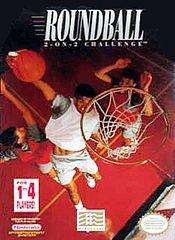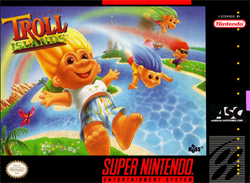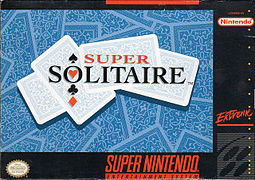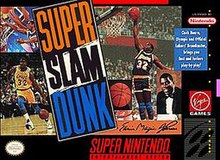
A slam dunk, also simply known as a dunk, is a type of basketball shot that is performed when a player jumps in the air, controls the ball above the horizontal plane of the rim, and scores by shoving the ball directly through the basket with one or both hands. It is a type of field goal that is worth two points. Such a shot was known as a "dunk shot" until the term "slam dunk" was coined by former Los Angeles Lakers announcer Chick Hearn.

SlamBall is a hybrid sport combining elements from basketball, football, hockey, and gymnastics played with four trampolines in front of each net and boards around the court edge. While SlamBall is based on basketball, it is a contact sport, with blocks, collisions and rough physical play as part of the game, similar to elements of American football and ice hockey.

Slam Dunk is a Japanese sports manga series written and illustrated by Takehiko Inoue. It was serialized in Shueisha's shōnen manga magazine Weekly Shōnen Jump from October 1990 to June 1996, with the chapters collected into 31 tankōbon volumes. The story follows a basketball team from Shōhoku High School, located in the Shōnan area of Japan.

Darrell Eugene Armstrong is a former American professional basketball player, who played 14 seasons in the National Basketball Association. He is currently an assistant coach for the NBA's Dallas Mavericks, who won the championship in the 2010–11 season.

Gerald Jermaine Wallace is an American former professional basketball player. Nicknamed "Crash", he was named an NBA All-Star and voted to the NBA All-Defensive First Team while with the Charlotte Bobcats in 2010. He played college basketball for the Alabama Crimson Tide.

Gerald Green is an American former professional basketball player. He was drafted by the Boston Celtics with the 18th overall pick in the 2005 NBA draft. Known for his dunking skill, he has performed well in many slam dunk competitions, having won the 2005 McDonald's All-American Slam Dunk Contest and the 2007 NBA Slam Dunk Contest, while finishing as the runner-up in the 2008 NBA Slam Dunk Contest.

Double Dribble is an arcade basketball video game developed and released by Konami in 1986. It was the second basketball arcade video game by Konami, following Super Basketball. It was considered the most realistic basketball sports video game upon release, with fast-paced action, detailed players, a large side-scrolling court, innovative cinematic slam dunks, and detailed sound effects, beginning a trend where presentation would play an increasingly important role in sports games.

Stromile Emanuel Swift is an American former professional basketball player. He played college basketball for Louisiana State University (LSU) before being drafted second overall by the Vancouver Grizzlies in the 2000 NBA draft. At 6'10" and 220 lbs, he played the power forward and center positions.

Future Basketball is a futuristic basketball video game released by Hewson Consultants for the Amiga and Atari ST in 1990. It was ported for the Super Nintendo Entertainment System (SNES) by Hudson Soft in 1991 as Bill Laimbeer's Combat Basketball. It was the first basketball game released for the SNES. The game stars Bill Laimbeer, who played for the Detroit Pistons of the NBA during a time when the team was notorious for aggressive and dirty, physical play.

NFL is a 1989 football video game, developed by Atlus and published by LJN exclusively for the Nintendo Entertainment System.

NBA Hangtime is a 1996 basketball arcade game developed and released by Midway. Home versions were released for the Nintendo 64, PlayStation, Super NES, Sega Genesis, and Microsoft Windows.

Brett Hull Hockey '95 is an ice hockey simulation video game released in January 1995 for multiple platforms; including the Super Nintendo Entertainment System, Sega Genesis, and personal computers running DOS.

Fastest 1 (ファステスト・ワン) is a Sega Mega Drive racing game video game released in 1991 exclusively in Japan. During the release of this video game, other Formula One video games like Super Monaco GP had caused a general increase of demand for Formula One video games. While most of those games were poor simulations of the races, Fastest One proved to be the most realistic of the era.

NBA Give 'N Go is a 1995 Super Nintendo Entertainment System basketball video game that uses licensed teams from the National Basketball Association. The game is essentially a home version of Konami's arcade game Run and Gun, which featured similar graphics and gameplay but no NBA license. Konami followed up Give 'N Go with Run and Gun 2 and the NBA In The Zone series.

Roundball: 2-On-2 Challenge is a two-on-two basketball video game for the Nintendo Entertainment System that is played on a half court.

Super Batter Up, known in Japan as Super Famista, is a baseball video game with both a one- and two-player mode plus a league mode.

Super Troll Islands is a platform game based on the license of bright-haired toys known as Troll dolls. A Sega Genesis version was planned but never released.

HAL's Hole in One Golf is a golf video game developed and published by HAL Laboratory for the Super Nintendo Entertainment System in 1991.

Super Solitaire is a Super Nintendo Entertainment System video game that has different variations version of the classic solitaire card game.




















